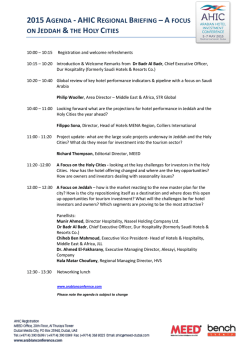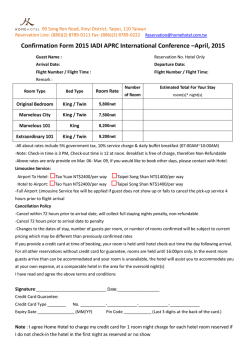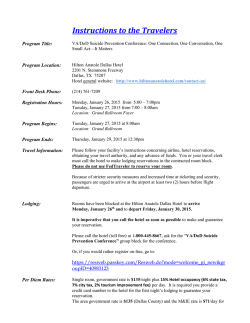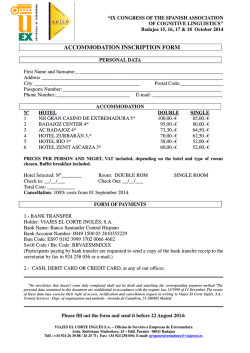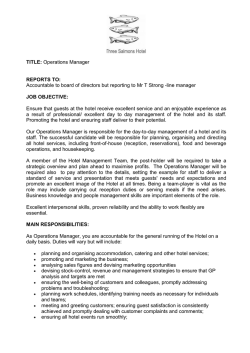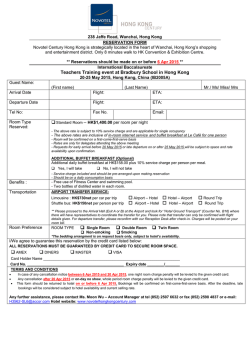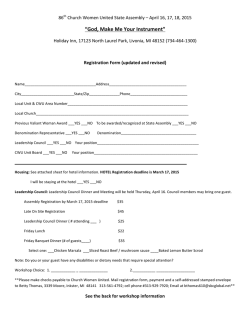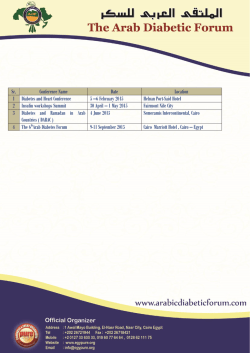
Customer Experience In Hospitality:
A Forrester Consulting Thought Leadership Paper Commissioned By Sabre Hospitality Solutions Customer Experience In Hospitality: Embrace Customer Data And Elevate The Guest Experience November 2015 Table Of Contents Executive Summary...................................................................................... 1 Improving The Guest Experience Is An Imperative .................................... 2 Challenges Limit Hoteliers’ Ability To Meet Guest Expectations............... 5 Hotels Must Integrate Systems To Achieve Unified Customer Data.......... 6 Key Recommendations ................................................................................ 7 Appendix A: Methodology ........................................................................... 9 Appendix B: Supplemental Material ............................................................ 9 Appendix C: Demographics/Data ................................................................ 9 Appendix D: Endnotes ................................................................................10 ABOUT FORRESTER CONSULTING Forrester Consulting provides independent and objective research-based consulting to help leaders succeed in their organizations. Ranging in scope from a short strategy session to custom projects, Forrester’s Consulting services connect you directly with research analysts who apply expert insight to your specific business challenges. For more information, visit forrester.com/consulting. © 2015, Forrester Research, Inc. All rights reserved. Unauthorized reproduction is strictly prohibited. Information is based on best available resources. Opinions reflect judgment at the time and are subject to change. Forrester®, Technographics®, Forrester Wave, RoleView, TechRadar, and Total Economic Impact are trademarks of Forrester Research, Inc. All other trademarks are the property of their respective companies. For additional information, go to www.forrester.com. [1-VAI1YH] 1 Executive Summary The hospitality industry today is competitive: Though the overall market is growing, hotels face competition not only from traditional brands, but also from boutique hotels, new upstarts, and online intermediaries. Compounding this trend, today’s travelers rely less on their direct relationships with brands. Instead, tech-savvy travelers research their trips ahead of time, prefer to book online, and often consult friends and online reviews. So it comes as no surprise that less than half of hotel guests — either business or leisure travelers — consider themselves loyal to a particular hotel brand. How can hotels increase loyalty? In today’s climate, hotels need to deliver more than just the basics of a comfortable bed and clean accommodations. Instead, they need to learn how to harness customer data and insights to elevate the hotel guest experience. Years of Forrester research has shown that improving the customer experience is one of the most effective ways to build retention, stimulate enrichment, 1 and generate advocacy that drives revenue. In fact, a small improvement in the overall customer experience can translate into significant revenue gains. For example, for upscale hotels, Forrester found a 1-point increase in its Customer Experience Index (CX Index™) score — Forrester’s benchmark that measures customer experience quality and loyalty — provides $6.52 in annual incremental revenue per customer. That doesn’t sound like much, but for a brand with 10 million customers, that 2 amounts to a $65 million impact annually. To better understand the need for the hospitality industry to become customer-obsessed in order to drive increased loyalty from travelers, in August 2015, Sabre Hospitality Solutions commissioned Forrester Consulting to conduct a research study on consumer expectations and hotels’ ability to deliver on those expectations. To explore these trends, Forrester tested the hypothesis that hotels require integrated enterprise software solutions to enable them to provide their customers with experiences that meet or exceed their expectations and drive loyalty. In conducting in-depth quantitative surveys with consumers and one-on-one interviews with hotel senior executives and CIOs, Forrester found that collecting and applying customer data and insights to deliver seamless, cross-channel experiences, especially to Millennial customers, along with providing personal touches to travelers in exchange for their data, is key to meeting customers’ expectations, thereby improving their customer experience and fostering loyalty. KEY FINDINGS Forrester’s study yielded four key findings: › › › › Customer loyalty is up for grabs. With the exception of frequent business travelers, less than half of business or leisure travelers are loyal to a particular hotel brand. Improving the guest experience is the best way to generate loyalty in the form of retention, increased spend, and advocacy. Consumers want seamless experiences across digital and offline channels. All travelers — but especially Millennials — expect seamless experiences when researching and booking across channels. Integrating customer data and systems will provide the foundation hotels need to meet these expectations. Personalization drives increased stays. More travelers would rather stay in a hotel that knows them versus one where they feel anonymous. Unifying customer data across technology platforms is the key to welcoming guests with a personal touch. Consumer attitudes toward data are shifting. Over half of travelers are willing to share their personal data with hotels, but they desire something in return. If hotels request traveler data and preferences, they had better be in a position to act on them. 2 away from booking a stay with another brand. And simple points-based loyalty programs are not enough to hinder this behavior; instead, years of Forrester research has shown that improving the guest experience is one of the most effective ways to build loyalty and drive revenue. Improving The Guest Experience Is An Imperative In the age of the customer, the relationships you have with your customers are the greatest source of competitive differentiation. And in order to strengthen those relationships and build loyalty, hotels must deliver guest experiences that meet or exceed expectations. That’s because traditional sources of customer loyalty and brand value no longer apply. Our survey found that: › › › Frequent travelers are more loyal. As travelers’ total number of nights stayed at any hotel in a year grows, so does their loyalty to a particular hotel brand (see Figure 1). This is especially evident for business travelers, as 59% of those staying 10 or more nights are loyal to one hotel brand, compared with only 34% of those staying a total of one to nine nights. FIGURE 2 Positive Word Of Mouth Is Critical “Please tell us how much you agree or disagree with each of the following statements.” I enjoy planning and buying travel on the Internet Even so, loyalty is up for grabs. Overall, about twothirds (64%) of leisure travelers and more than half (52%) of business travelers said they are not loyal to a particular hotel brand. These travelers are just an offer or a click 59% 69% I trust content from other travelers more than a travel company’s marketing or advertising I rely a lot on recommendations from my friends and family when making travel purchases “Please tell us how much you agree with the following statement: ‘I consider myself loyal to one particular hotel chain.’” Business (N = 100) 72% I often tell my friends about travel products, services, or destinations that interest me FIGURE 1 Frequent Travelers Are More Loyal To Hotels, But Overall The Majority Of Travelers Are Not Loyal Leisure (N = 200) Word of mouth is critical. Given loyalty is up for grabs, travelers often rely on advice from family and friends when booking a hotel. We found 69% of travelers tell their friends about travel products and services, and 46% rely on recommendations from friends and family when making travel purchases (see Figure 2). 61% 46% Base: 300 US leisure and business travelers staying in a hotel in the past 12 months (showing combined “strongly agree” and “agree” responses) Source: A commissioned study conducted by Forrester Consulting on behalf of Sabre Hospitality, September 2015 42% 34% 29% › 1 to 9 10+ Total number of nights stayed at any hotel in past 12 months Base: 300 US leisure and business travelers staying in a hotel in the past 12 months (showing combined “strongly agree” and “agree” responses) Source: A commissioned study conducted by Forrester Consulting on behalf of Sabre Hospitality, September 2015 Millennials are most susceptible to other’s perceptions. Our research shows that 64% of travelers agreed that what other travelers say about a hotel has a strong impact on their perception of that hotel. This varies greatly by age bracket, with 79% of Millennials agreeing, 68% of those age 35 to 54 agreeing, and 55% of those age 55 and above agreeing. 3 HARNESSING CUSTOMER DATA IS THE KEY TO DELIVERING ON GUESTS’ EXPECTATIONS A great guest experience today means more than a clean room and comfortable bed. Today's customers expect companies to make use of the abundance of customer data available to improve their experiences and interactions. Harnessing customer data and related insights allows hotels to structure content and experiences around the needs of individual customers. Further, Forrester’s research shows 62% of US online adults have chosen, recommended, or paid more for a brand that provides a personalized service 3 or experience. Our research showed that: › Data-driven personalization drives brand preference. More travelers (39%) prefer to stay in hotels that know them compared with hotels that don’t (21%). And the older someone is, the more likely that this is true, with 42% of those 55 or older agreeing (see Figure 3). FIGURE 3 Thirty-Nine Percent Would Rather Stay In A Hotel That Knows Them “Please tell us how much you agree with the following statement: ‘I would rather stay in a hotel that knows me than one where I feel anonymous.’” Agree › Personalized experiences engender greater emotion. How an experience makes a customer feel trumps utility and ease and has the greatest influence on loyalty for 4 hotel guests. Personalized experiences engender greater emotional engagement through relevancy, providing 5 customers more of what they want, when they want it. TRAVELERS ARE WILLING TO SHARE THEIR PERSONAL INFORMATION › Consumers’ attitudes toward their data are evolving. More than half of travelers are open to sharing personal information. But they desire something in return like relevant deals, discounts, or loyalty points (see Figure 4). That’s right in line with findings about consumer trust overall — if they trust you, they are willing to share more 6 data in exchange for value. But beware of breaking this trust: As recent data breaches have shown, consumers FIGURE 4 Travelers Are Willing To Provide Personal Information For Relevant Offers “Please tell us how much you agree or disagree with the following statement: ‘I don’t mind when hotels use my personal information to offer me relevant deals, discounts, and loyalty points.’” 58% Disagree 51% Total 39% 47% 21% 39% 55+ 42% 20% Respondent age 35 to 54 36% 19 to 34 35% 18% 32% Total (N = 300) 19 to 34 (N = 56) 35 to 54 (N = 115) 55+ (N = 129) Base: 300 US leisure and business travelers staying in a hotel in the past 12 months Base: 300 US leisure and business travelers staying in a hotel in the past 12 months (neutrals removed) (showing combined “strongly agree” and “agree” responses) Source: A commissioned study conducted by Forrester Consulting on behalf of Sabre Hospitality, September 2015 Source: A commissioned study conducted by Forrester Consulting on behalf of Sabre Hospitality, September 2015 4 take their money elsewhere if they don’t trust what you’re doing with their data. › Travelers are most willing to share trip-related personal information. Seventy-five percent of travelers are open to sharing room preferences, and more than half will consider sharing trip or contact information (see Figure 5). In exchange for this information, travelers are most interested in receiving convenient check-in and checkout times, but 36% of Millennials and 37% of travelers age 35 to 54 are willing to share personal information in return for personal touches in their room (see Figure 6). FIGURE 5 Travelers Are More Willing To Provide Certain Types Of Personal Information 79% Room preferences 55% Contact information 55% Payment information 42% Ratings/opinions (online reviews, surveys, comments) Dietary requirements and preferences 45% A room chosen for me based on my preferences from past stays 45% 57% 52% 58% 57% Access to local travel guides who speak my language 31% 42% 52% 24% 35% 46% Room thermostat set to my preferred temperature 24% Other personal touches in my room 22% A personalized booking confirmation 22% 31% 38% 37% 41% 37% 36% 37% 30% Music preferences 24% Group memberships and affiliations 22% Hobbies 21% Time/location (GPS position, sensor data) Getting check-in and checkout times that fit my travel schedule 75% Trip information (flight number) Tech ownership and use “How willing would you be to share personal information and preferences in exchange for the following personal touches during your hotel stay?” Help discovering places and activities in the local area that interest me “Which of the following types of personal data or personal preferences would you be willing to share in exchange for a more personalized hotel experience?” Room location preferences FIGURE 6 Consumers Are Willing To Share Data In Exchange For Convenience And Personal Touches 13% Being greeted by name when I check in 7% Household information 7% Calendar 7% Base: 300 US leisure and business travelers staying in a hotel in the past 12 months Source: A commissioned study conducted by Forrester Consulting on behalf of Sabre Hospitality, September 2015 37% 29% My favorite newspaper left in my room 21% 29% 29% Minibar stocked with my favorite snacks 11% 19% 29% 11% Social media 19% Gym machine reserved for me at my preferred workout time 11% 14% 25% 55+ (N = 129) 35 to 54 (N = 115) 19 to 34 (N = 56) Base: 300 US leisure and business travelers staying in a hotel in the past 12 months (showing combined “very willing” and “willing” responses) Source: A commissioned study conducted by Forrester Consulting on behalf of Sabre Hospitality, September 2015 5 Challenges Limit Hoteliers’ Ability To Meet Guest Expectations Despite guests’ willingness to share personal data, hotels’ reliance on splintered technology systems that fragment data inhibit their ability to collect and act on this data to meet their guests’ expectations. With a unified view of their guests, hotels would have the opportunity to: › › › Create targeted marketing, including deals and discounts. Travelers are interested in targeted deals and offers, but hotels are challenged to provide these because they are limited in the data they have on their customers. Data that is collected through booking is often incomplete and not matched with information from guests’ prior stays. A hotel executive reported: “Today all we have is information from the central reservation system and booking engine. Integration with the property management system would give us a better idea of who our customer is. . . . This would help us develop better promotions and programs. Today we’re only looking at half the glass.” Provide seamless cross-channel experiences. ® Forrester’s Consumer Technographics data shows that today, 59% of consumers have switched devices when completing common tasks such as shopping online and 7 getting directions. Travelers are no different. If encountering problems booking online, 60% expect hotel personnel they call to be aware of the issue. More than half (54%) expect to make changes to their reservation on the same or different channel than the one used to book. And half of travelers expect hotels to save their information to make it easier to research and book on different devices. Unsurprisingly, Millennials have the highest expectations for cross-channel engagement (see Figure 7). But hotels have no hope of serving customers effectively across channels if they can’t store and match customer data across systems. Deliver personalized guest experiences. Further technology challenges, coupled with training and resource issues, inhibit hoteliers’ ability to act on customer data provided. For example, even when one hotel collects customer preferences, it doesn’t guarantee another hotel in the chain will have access to those preferences if their systems are not interconnected. Further, as one hotel executive shared, the challenge in the industry “is not only gathering the preferences but making sure they are executed at a local level. We have a lack of ability to ensure that the last mile, or execution piece, is done consistently.” As another executive put it: “When guests show up, they are supposed to feel like VIPs at each property. Some properties do a great job at providing this and some don't.” FIGURE 7 Millennials Have High Expectations For CrossChannel Experiences “Thinking about your expectations for your hotel booking experience, please tell us how much you agree with the following statements.” 55+ (N = 129) 35 to 54 (N = 115) 19 to 34 (N = 56) I expect to make changes to my hotel reservation on the same or a different channel than the one I used to book If I’m encountering problems booking travel online and I call the hotel directly, I expect hotel personnel to be aware of those issues I want to be able to research travel on one device and complete the booking on another I expect hotels to save my information and make it easier for me to research and book my hotel on different devices and know I'm the same person 41% 62% 68% 58% 60% 64% 33% 51% 57% 47% 53% 54% I expect hotels to have information about my travel that I provide to web-based travel agencies 33% If I start a hotel reservation on the phone, I expect to be able to complete it online 24% 30% 41% 54% 48% Base: 300 US leisure and business travelers staying in a hotel in the past 12 months (showing combined “strongly agree” and “agree” responses) Source: A commissioned study conducted by Forrester Consulting on behalf of Sabre Hospitality, September 2015 “It is uber-critical that our systems are integrated — we wouldn't be able to do some of the things we do without the integration.” — Corporate director, revenue management and distribution 6 “The upgrades made the PMS more tightly integrated with the reservation system. . . . By upgrading, we were able to establish an API for our anywhere check-in program that allows users to check in remotely.” — Vice president of technology and services Hotels Must Integrate Systems To Achieve Unified Customer Data Years of independent technology purchases coupled with a lack of integrated enterprise solutions leave most hotels with customer data scattered across shopping, booking, reservation, property management, and customer relationship management systems. Hotel executives agree that obtaining a clearer picture about the customer is critical; however, they are often limited by their own technology. To improve the guest experience, hotels need to invest in integrated systems for storing and accessing guest data: › Unifying or investing in integrated systems will provide visibility across properties. Unifying customer data across systems, especially property management systems (PMS), one of the most widely relied on technology platforms, is the best way for hotels to recognize and reward guests and generate loyalty. “Our systems very much hinder our efforts today to provide a personalized experience. We have a hard time welcoming a guest back. We can sometimes identify someone who has been to the same property again, but because of the separate property management systems, it's hard to identify guests across properties.” — Vice president, revenue strategy and distribution › A single view of the customer can only be achieved with these technology investments. Without this single view, brands can’t perform the comprehensive analytics or business intelligence they need to create targeted offers and rewards, calculate customer churn, or forecast revenue with confidence. Further, integration is often a prerequisite for more digital experiences, such as anywhere check-in, that consumers are coming to expect. “Information stored in the PMS does not get flowed back to the centralized data system, so we can't manage customer data in a centralized way because there’s no way to capture it today.” — Vice president of distribution › Solutions that integrate reservation data from online travel agencies (OTAs) provide efficiencies for hotel staff. With reservations flowing in from multiple OTAs, as well as direct digital and offline channels, hotel staff who have to enter data from bookings manually can be easily overwhelmed. Solutions that integrate OTA and direct booking data into reservation systems cut down on manual processes and resulting human error. “Ideally, we would not ask for guest data. Instead we would observe guest behavior, make note of it, and then use it to surprise and delight in the future.” —Vice president, revenue strategy and distribution › Cloud-based solutions underpin universal data storage and retrieval. Cloud solutions fuel any hotel’s transition to a digital business, providing access to technology-enabled services in minutes, empowering employees through self-service solutions, and providing the flexibility needed to avoid long-lasting capital expenditures. These benefits combine to provide the agility hotels need in their business technology to quickly adapt and respond to market changes. 7 Key Recommendations Forrester’s in-depth survey of leisure and business travelers, coupled with interviews with hotel executives and senior IT professionals, shows consumers’ expectations for their travel experience today and hotels’ challenges delivering on them. Unifying guest data through better integration of technology platforms will help hotels become more customercentric. Convincing business and technology leadership to invest in integrated enterprise solutions won’t be easy. But to enable the digital experiences and personal touches that guests are coming to expect, as well as the robust business intelligence that hotels need to inform their decision-making, unifying customer data is an imperative. To develop the technology, practices, and culture required to effectively harness customer data and insights, hoteliers should: › › › › Rethink loyalty strategy as one built on customer data and insights. In the age of the customer, the relationships businesses have with their customers and the loyalty customers demonstrate trump traditional sources of competitive advantage. But generating loyalty isn’t as easy as a program designed around points and rewards. Instead, hotels need to advance their loyalty strategies to encompass customer experience, brand experience, customer service, and, yes, loyalty programs that collectively foster loyalty across the organization. When businesses engender loyalty among their customers, they encourage customers to share all kinds of profile, preference, and behavioral data. Insights derived from this data can then be used to reinforce the customer relationship by targeting outbound communications more effectively, delivering personalized content, streamlining the purchase experience, providing more proactive customer service, and capitalizing on customer engagement. Companies with a known reputation for engendering loyalty don’t rely on loyalty programs, but rather use customer understanding and insights to solidify their customer relationships. Push vendor partners to innovate. Before the era of real-time communications and cloud computing, the notion of a single enterprise system storing customer data for thousands of hotels was incomprehensible. But now that possibility is attainable. In fact, hotel executives see it as an eventuality. One commented: “Big brands are trying to combine their property management and central reservation systems, and eventually this will happen. It’s not if this will happen, but when it will happen.” But there’s one major roadblock: Hotels are “waiting for the right technology to come along to help combine all their systems.” While the solutions provided by vendors today are certainly an improvement over fractured legacy systems, hotels need to share their evolving business and technology requirements with vendors so that together they can develop the systems needed to fuel their customer-obsessed enterprises. Change the culture by proving the value of customer data and insights to individual hotel owners. Our interviews found that a hotelier’s biggest concern when choosing a property management system is cost. But that doesn’t mean brands should give up on integrating these systems. Instead, they need to make the business case to hotel owners and operators that cost isn’t the only factor. For example, better connectivity and functionality can help individual hotels more effectively manage their inventory online and provide better analytics for predicting revenue and market share. Customer insights can also help with their own marketing campaigns. Plus, there’s hope that attitudes will shift. As one hotel executive commented: “Some of [the hotel owners] are a little suspicious of centralized data — there's a fear factor involved if the brand knows too much. But as a lot of older hotel owners retire, and a second generation comes up, they are more tuned in to data and technology and have a different mindset. They are very savvy and very excited to see the value of having a complete picture of the guest.” Create training and processes to effectively act on guest data. Having a complete view of the customer is great — but it’s not enough to guarantee that customer data is being acted on appropriately at all levels. In fact, many interviewees shared the sentiment that “the biggest issue once you have the data is acting on it.” Part of this challenge is a technology problem, which is why one hotel is focused on improving the visibility of personal data through “pop ups” in its system so employees can automatically see whether guests prefer a lower floor or a 8 certain type of beer, for example. But brands also have to set expectations for staff at all levels — including managers, those at the front desk, and those in housekeeping — as to their responsibility for delivering a personalized experience before and during a guest’s stay. Otherwise, inconsistent experiences will only detract from positive efforts. 9 Appendix A: Methodology In this study, Forrester conducted an online survey of 300 US leisure and business travelers to learn more about their customer experience with hotels as they book and travel. In addition, we conducted 11 qualitative interviews with senior hotel executives and VPs from marketing and technology roles to understand their priorities around customer experience and the technology platforms that support these initiatives. Eight of these interviews were sourced from Sabre’s customer base; the remaining three were sourced by Forrester. The study began in August 2015 and was completed in September 2015. Appendix B: Supplemental Material RELATED FORRESTER RESEARCH “The Revenue Impact Of Customer Experience,” Forrester Research, Inc., August 11, 2015 Appendix C: Demographics/Data FIGURE 8 Traveler Respondent Breakdown “Thinking of your travel in the past 12 months, approximately how many nights have you stayed in a hotel for leisure/personal or business travel?” US: 100% 50 nights or more Between 40 and 49 nights 47% 53% 100 Business travelers 200 Leisure travelers Between 30 and 39 nights “Which range includes your age?” Between 20 and 29 nights 19 to 34 19% 35 to 44 19% 45 to 54 55 to 64 10% 20% 21% Base: 300 US leisure and business travelers staying in a hotel in the past 12 months (percentages may not total 100 because of rounding) Source: A commissioned study conducted by Forrester Consulting on behalf of Sabre Hospitality, September 2015 Business (N = 100) 8% 4% 4% 13% 14% 20% 32% 35% 31% Between 5 and 9 nights 22% Leisure (N = 200) 2% Between 10 and 19 nights Between 1 and 4 nights 65+ 2% 14% 13% 10 Appendix D: Endnotes 1 Source: “What Drives A Profitable Customer Experience,” Forrester Research, Inc., June 27. 2014. 2 Forrester modeled the relationship between “customer experience” and revenue potential for each brand in its CX Index. Using these industry-specific models, Forrester analyzed the effect on revenue potential of increasing CX Index scores by 1 point from the industry average CX score. For the hotel industry, we asked customers — defined as those who have stayed at one of the brand’s hotels in the past 12 months — about the number of additional nights they intend to stay at a hotel, how much they intend to spend on extras like breakfast or Wi-Fi, and how often they recommended the hotel, if at all. By combining these customer insights with expert input (e.g., for hotels, we assumed an average price per night and spend on extras), the model calculates the revenue potential for each customer of a given brand. The number of customers represents the number of customers of a big player in the industry based on inputs that include Forrester’s Consumer ® Technographics , Forrester’s analysts, and publically available industry data. Source: “The Revenue Impact Of Customer Experience, 2015,” Forrester Research, Inc., August 11, 2015. 3 Over the past decade, marketers have become adept at using customer data to personalize recommendations, offers, and messages. In addition, there are now new efforts to use customer data to personalize customer experiences. These efforts differ from traditional personalization in that they expand the application of customer data beyond offers and messages to include content, functionality, and interaction. Source: “Just For You: Use Personalization Technology To Help Associates In The Retail Store,” Forrester Research, Inc., July 23, 2015. 4 Source: “Understanding The Impact Of Emotion On Customer Experience,” Forrester Research, Inc., July 13, 2015. 5 Source: “Personalization And The Rise Of Individualized Experiences,” Forrester Research, Inc., December 9, 2014. 6 Source: “The New Privacy: It’s All About Context,” Forrester Research, Inc., December 19, 2013. 7 Source: “Customer Experience In the Post-PC Era," Forrester Research, Inc., November 3, 2015.
© Copyright 2026
